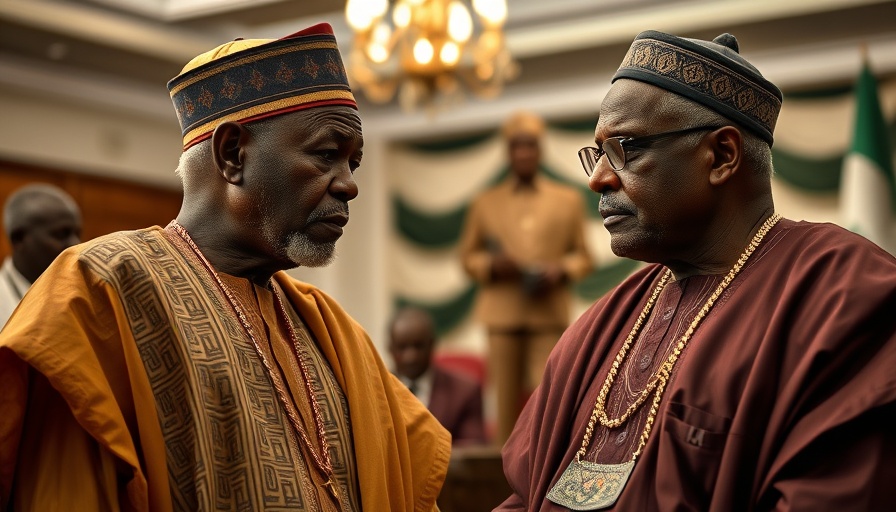
The Political Crisis in Rivers State: An Overview
The political crisis in Rivers State, Nigeria, has reached unprecedented levels, necessitating intervention at the national level. Recently, President Bola Ahmed Tinubu presented a budget of approximately 1.481 trillion naira for the state to the National Assembly, a move prompted by the suspension of the state’s governance structures under a state of emergency. This situation has sparked intense debate among local leaders and citizens regarding the legality and implications of such federal involvement in state affairs. The series of events, which began with the suspension of the governor, deputy governor, and the entire House of Assembly, has led to significant unrest and uncertainty about the state's governance.
In 'Rivers State Political Crisis: A Path Toward Peace?', the discussion dives into the complexities of governance in Rivers State, highlighting key insights that sparked deeper analysis on our end.
Emergency Rule: A Necessary Measure or Overreach?
The declaration of a state of emergency had been marked by turmoil, with significant implications for the governance of Rivers State. According to Chik Ka, the publicity secretary for the Rivers State All Progressives Congress (APC), while the emergency rule has constitutional backing, it underscores a failure to address early warning signs that could have prevented the current crisis. The root cause—discoordination between the executive and legislative arms of government—has hampered service delivery and disrupted daily life for residents.
On the other hand, opinion leader Igbon Igbanibbo Keill expressed skepticism about President Tinubu's measures, deeming the process fundamentally illegal and a deviation from the will of the Rivers people. His remarks highlight the pervasive mistrust in state leadership and concern about the implications of federal rule over local governance.
Understanding Public Sentiment Amid Political Turmoil
The suspension of elected leaders has not been without consequences. Residents have voiced their frustrations, noting a sense of abandonment and insecurity, especially with recent kidnappings in the state. The emotional toll this unrest has taken on the populace cannot be understated, as many feel disenfranchised from a process that should have prioritized their safety and collective well-being. For instance, Camil, another local opinion leader, has pointed out the stark reality faced by families of kidnapping victims who now live in fear for their loved ones.
For the people of Rivers State, the need for effective governance has never been more urgent. As local leaders emphasize, public safety and stability must take precedence if the political climate is to improve. This tragedy has painfully illustrated the gap between responsibility and current proceedings.
Paths to Peace: The Role of Key Stakeholders
Amid conflicting interpretations of governance, attempts to rebuild peace have emerged. The involvement of various stakeholders—including former governors and political leaders—has been highlighted as crucial for achieving lasting tranquility in the state. However, there are conflicting interests, as some parties appear hesitant to support peace efforts, often stemming from personal political motivations or power struggles.
The process toward reconciliation is ongoing, but caution needs to be exercised. As noted by political analysts and local voices, vested interests that disrupt peace efforts could potentially lead to further misunderstandings and hostilities. The road to peace lies not just in political negotiations but in the ability of various factions to recognize a shared goal: the well-being of the Rivers people.
Conclusion: The Quest for a Stable Governance Model
As Rivers State grapples with significant governance challenges, the complex interplay of political dynamics calls for acute scrutiny. Both the legal frameworks surrounding the state of emergency and the sentiments of the local populace must be balanced to pave a path forward. Driving genuine peace will require commitment, understanding, and a focus on shared objectives among all parties involved. As we observe ongoing political developments, the future of peace in Rivers State hinges not only on adherence to constitutional practices but also on the leaders’ willingness to genuinely engage with the electorate they represent.
Moving forward, the situation warrants vigilance from both the state’s citizenry and the broader political community. Engaged dialogue and accountability will be essential in shaping a stable governance system that truly reflects the hopes and aspirations of Rivers State’s people.
 Add Row
Add Row  Add
Add 


 Add Row
Add Row  Add
Add 

Write A Comment